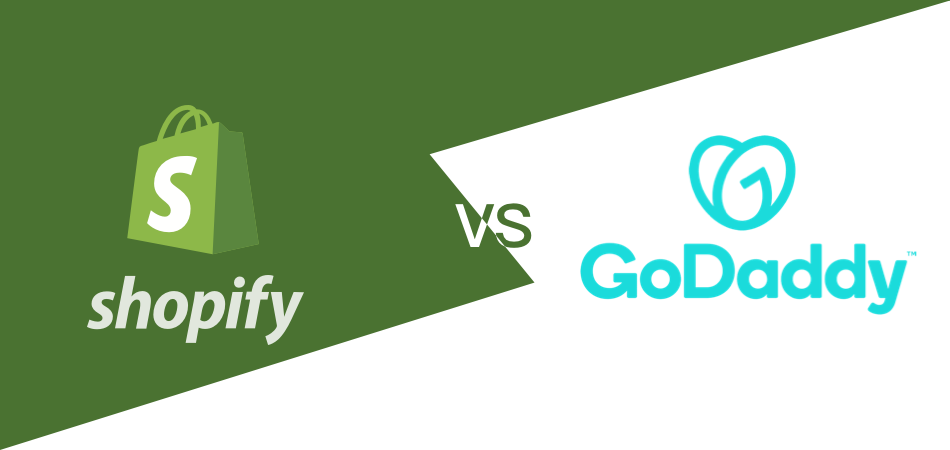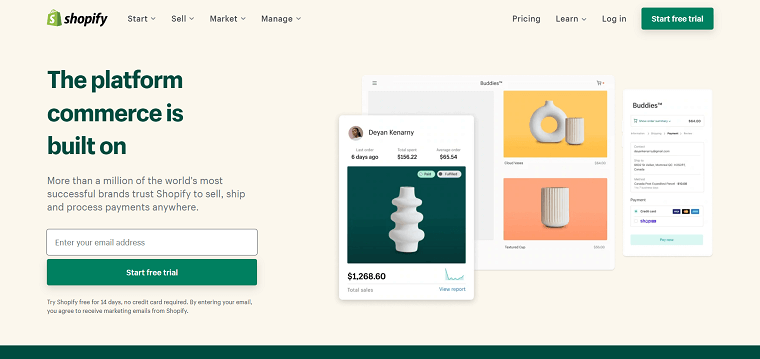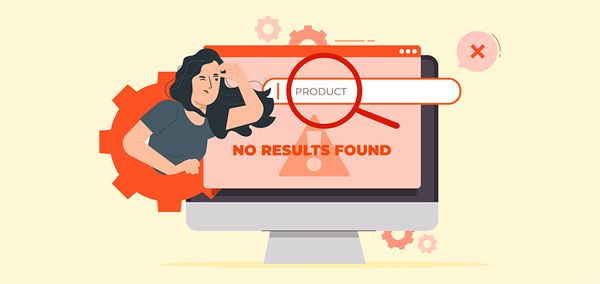Shopify vs. GoDaddy: Online Store Builder or Website Hosting

GoDaddy and Shopify are both popular choices for those looking to set up an eCommerce store. Both have their pros and cons, so it's essential to choose the one that's right for you. Here's a quick rundown of the two platforms to help you make a decision.
Shopify vs GoDaddy: The Basics
Shopify is a comprehensive eCommerce platform that offers everything you need to set up and run your store, including hosting, design templates, and payment processing. It's easy to use and scalable, so it can grow with your business.

The downside is that it can be expensive, especially if you need to use third-party apps to extend its functionalities. Shopify is one of the most popular eCommerce systems available. It presently has over 600,000 online retailers and over 1.2 million registered users: remarkable statistics for an ideal platform.
GoDaddy not only provides hosting and website design, but it also helps to create robust eCommerce businesses. You can develop online shops in minutes using an ADI (Artificial Design Intelligence) by answering a few basic questions about your eCommerce requirements.
We realize it's difficult to choose the right platform for your eCommerce goals, since they're both amazing platforms with their own strengths and drawbacks. We're here to assist at DSers, which is why we've done our own research on each platform to make your selection simpler.
Pros and Cons of Shopify and GoDaddy
Shopify Pros and Cons
Shopify is the greatest eCommerce platform on the market since it offers an easy-to-use inventory system and allows you to sell on other platforms such as Facebook, Instagram, and Pinterest. However, compared to its rivals, Shopify's trial period is very limited, and if you don't utilize Shopify Payments as your payment gateway, you'll have to pay transaction costs.
GoDaddy Pros and Cons
GoDaddy utilizes ADI to establish online shops in a flash — it's a convenient and fast option. It also serves a diverse range of enterprises, making it a suitable option for almost any eCommerce project. On the negative side, some of GoDaddy's capabilities are limited in scope and quality, and you can't sell digital items.
Shopify vs GoDaddy: Complete Comparison
Flexibility in the Designs
Shopify
Shopify offers more than 60 themes, all of which were designed by freelance designers. The premium themes range in price from $100 to $180, but if you're on a budget, there are nine free themes to choose from.
In terms of functionality, Shopify's themes include a product zoom feature that allows visitors to have a more engaging shopping experience. Additionally, they have a shopping cart icon in the top right corner, which indicates that Shopify's layouts are all user-friendly.
GoDaddy
The ADI from GoDaddy can build approximately 1,500 distinct sorts of industry-specific websites. There are around 19 theme choices for each industry it serves, however, bear in mind that after your site is produced, you won't have much creative flexibility.
Last but not least, smartphone-responsive themes are available on both platforms. This means that your online shop will resize to suit any screen size, ensuring that it looks good on all devices. It's worth noting that both platforms require quite a lot of work in terms of rendering your website as accessible to users with disabilities. You'll have to integrate with solutions such as accessible to have your Shopify store be ADA compliant.
Fees and Payment Options
You may sell to a larger audience and make more money by allowing additional payment options. As you can see, it's critical that the platform you choose provides a variety of payment choices as well as cheap transaction costs.
Shopify offers a wide range of payment alternatives. PayPal, Stripe, Amazon Pay, Apple Pay, and even cryptocurrencies and cash on delivery are among the gateways it accepts.
But at the same time, Shopify is less inclusive in terms of transaction expenses. Unless you utilize Shopify Payments, the platform's own payment gateway, you must pay transaction fees on all payment channels. When you use Shopify Payments, you just pay the credit card company's standard credit card rates.
This is another area where GoDaddy performs well. It allows the three most common payment methods – PayPal, Stripe, and Square – and Apple Pay via Stripe. GoDaddy, on the other hand, redeems itself by charging no transaction fees via any payment method. The only price you'll pay, as with Shopify Payments, is the standard credit card fee, which is normally approximately 2.2 percent of each transaction.
Price
It's critical to consider the platform's operating expenses while creating an eCommerce business. Do the Shopify pricing plans fit within your budget? Will GoDaddy be a better fit for you? Let's have a look.
- Basic – $29/month
- Shopify – $79/month
- Advance Shopify – $299/month
Check out the chart to see what each pricing plan includes. Overall, Shopify is a terrific value-for-money option, with some of the greatest eCommerce tools and customer service available. It's worth mentioning that ShopifyPlus, a customized plan option only accessible through quotation, is also available.
In terms of price, GoDaddy is a lot more straightforward than Shopify. There is just one eCommerce package available, which costs $24.99 per month. While this pricing plan makes budgeting straightforward, there aren't enough sales-specific capabilities – like bulk product imports or analytics – to make it as excellent value for money as Shopify.
Ease of Use
Many people work very hard to run a business. Building an online shop shouldn't seem like another obstacle to add to the pile of bills, client pitches, and other chores.
Isn't it true that Shopify wouldn't be as popular if it was difficult to use? The fact is that Shopify is simple to use — it just takes a few clicks to sign up for a free trial, the drag-and-drop design makes designing your shop a breeze, and there are lots of visual clues to guide you from start to end. But it can't compete with GoDaddy.
GoDaddy takes the cake when it comes to simplicity of use. Its ADI can create a whole eCommerce shop in only a few minutes — all you have to do is answer a few questions about your company and sector, and you'll be given a ready-to-publish website.
| Get Started Now to Grow Your Online Business with the Best AliExpress Dropshipping Tool - DSers! |
However, it should be noted that GoDaddy's usage of ADI limits your creative flexibility. Shopify provides you with the tools you need to bring your brand's vision to life in your online shop.
Tools and Features
Shopify is the most popular eCommerce platform. It's unsurprising that it does well in this area; it has all the eCommerce features necessary to easily sell, ship, and return things.
You can have an endless number of goods in your Shopify shop, as well as various product variations (like color and size). It also has an abandoned cart recovery tool, which encourages clients to complete a transaction after leaving your site without paying. This is critical, given that 71% of US customers leave their shopping carts at the checkout.
Refunds are a necessary part of operating an internet business, and Shopify has simplified the shipping procedure. It works with a number of well-known shipping companies, including USPS, DHL Express, UPS, and Canada Post, and you can print labels if you're in the US, enabling you to personalise your mail.
GoDaddy performs a decent job with eCommerce features. Your GoDaddy online shop can only have 5,000 goods, and you can't measure client involvement or VAT expenditure.
A lot of people like GoDaddy because of the automated reminders for people who leave their carts behind. This is an advantageous feature since it enables you to send automated emails to customers reminding them to check out at the click of a button.
Help and Support
Customer service is a vital aspect of creating a successful eCommerce empire since it keeps your online shop functioning, the revenue flowing, and the consumers pleased. But which platform is the most beneficial?
Shopify pulls out all the stops once again. It offers phone and live chat assistance around the clock, as well as email and social media support. There is also a forum that can help you with any problems you might have. You'll never be in the dark when you utilize Shopify.
GoDaddy is also a great resource. It's one of the most helpful platforms on the market today, including phone support 24 hours a day; live chat assistance, and online lessons. It even has its own Twitter account for customer service. However, it loses points for not offering live chat or technical support 24 hours a day, seven days a week.
Conclusion
It simply outperforms GoDaddy in the eCommerce category, because of its high-quality features, excellent customer service, and a wide choice of approved payment channels. GoDaddy is an exceptional eCommerce platform, but it falls short of Shopify in some critical aspects.
People use Shopify because it's a great way to run a business and because it's easy to use. For any size online business, it's the best choice. It comes with all of the tools you need to build an eCommerce empire.
GoDaddy is great for those that wish to rapidly set up an online shop and don't need a lot of complicated sales tools. Essentially, GoDaddy is a fantastic alternative if you don't have the time to spend hours building an internet business.
With that being said, Shopify is a great option for practically every online shop. It strikes the correct blend of simplicity and sophistication in every way — it's simple to set up a Shopify site, and you have access to some of the most sophisticated sales tools available.
It's also a successful, budget-friendly platform, with a 14-day free trial and fees beginning at $29 per month.













 Company
Company
 Why Choose DSers
Why Choose DSers
 Blog
Blog
 Help Center
Help Center




 Live Chat
Live Chat